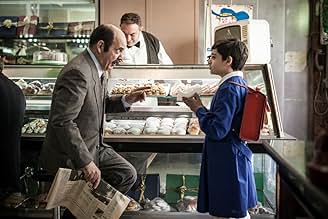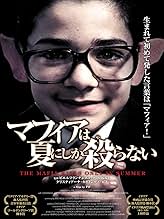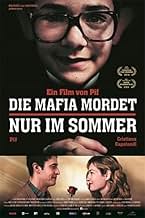AVALIAÇÃO DA IMDb
7,1/10
9,1 mil
SUA AVALIAÇÃO
Adicionar um enredo no seu idiomaPalermo in the 1970s. Ten-year-old Salvatore Giammarresi's life revolves around school and his first love, his sister's escapades and his parents' dreams. But the shadow of the Mafia and its... Ler tudoPalermo in the 1970s. Ten-year-old Salvatore Giammarresi's life revolves around school and his first love, his sister's escapades and his parents' dreams. But the shadow of the Mafia and its crimes hangs over everything.Palermo in the 1970s. Ten-year-old Salvatore Giammarresi's life revolves around school and his first love, his sister's escapades and his parents' dreams. But the shadow of the Mafia and its crimes hangs over everything.
- Prêmios
- 15 vitórias e 20 indicações no total
Antonino Bruschetta
- Fra Giacinto
- (as Ninni Bruschetta)
- Direção
- Roteiristas
- Elenco e equipe completos
- Produção, bilheteria e muito mais no IMDbPro
Avaliações em destaque
This is a nationally-acclaimed director debut of Italian's new triple-threat Pif, who directs, co-writes and stars in this satirical comedy, chronicling the turbulent mafia assassinations in Palermo from 1970s to 90s, through the eye of Arturo (played by Bisconti as a young boy and Pif himself as the grownup), who life has been significantly influenced by the local mafia activities, usually accompanied by Pif's smug voice-over, he even self-claims his own birth is thanks to a mafia shootout downstairs of his parents' apartment, although the animated scenes are riddle with biological errors, nevertheless, the jaunty atmosphere is pleasing enough to lure audience into the storytelling.
A consistent thread running through all the various but cursory political assassinations is Arturo's unrequited affection towards his classmate Flora (played by Antona as a child and Capotondi as the adult), arguably the film's most delightful parts come from the childhood period, Pif manages to depict a rather humorous scenario out of the horrendous events happening wantonly, a highlight is Arturo's immense worship towards Il Divo, Giulio Andreotti, to reflect how political figures can wreak major influence on a white-sheet soul. After almost one-hour screen time (the film only runs in a terse 90 minutes), Arturo and Flora's finally run into each other's lives in their adulthood, the sudden jump creates a dissonance between Pit and Bisconti, especially the latter infuses Arturo with cherubic cuteness and tangible earnestness, also in physical terms, there are no clue or whatsoever to indicate that they are the same person with 20 years of age differences, and the budding romance has been snuffed out to pave the way for a self-indulgent rom-com which feels so trivial and contrived under the current of what was actually going on at then.
Reaping 2 awards (BEST NEW DIRECTOR and David OF THE YOUTH for Pif) out of its overall 9 nominations in David DI DONATELLO Awards and many new director trophies in domestic award circuits in 2014, the film certainly can connect more towards those who are well versed in the real events of the region and can finally laugh about the resonances afterwards, but for audience out of Italy, it falls flat in its executions when compared to a similar triple threat Guillaume Gallienne from its neighbour France, with his fetching debut and CÉSAR crowner Me, MYSELF AND MUM (2013), maybe in a certain extent, it also frankly reveals the present cinematic creativity and soils of these two great countries (both have enormously rich contributions towards world cinema), and now sadly, a visible gap seems to be widened through recent years, if this film can be a serious winner of BEST DEBUT in a calendar year, it is not a good sign for the mired Italian contemporary cinema scenes, scintillating new blood is urgently wanting.
A consistent thread running through all the various but cursory political assassinations is Arturo's unrequited affection towards his classmate Flora (played by Antona as a child and Capotondi as the adult), arguably the film's most delightful parts come from the childhood period, Pif manages to depict a rather humorous scenario out of the horrendous events happening wantonly, a highlight is Arturo's immense worship towards Il Divo, Giulio Andreotti, to reflect how political figures can wreak major influence on a white-sheet soul. After almost one-hour screen time (the film only runs in a terse 90 minutes), Arturo and Flora's finally run into each other's lives in their adulthood, the sudden jump creates a dissonance between Pit and Bisconti, especially the latter infuses Arturo with cherubic cuteness and tangible earnestness, also in physical terms, there are no clue or whatsoever to indicate that they are the same person with 20 years of age differences, and the budding romance has been snuffed out to pave the way for a self-indulgent rom-com which feels so trivial and contrived under the current of what was actually going on at then.
Reaping 2 awards (BEST NEW DIRECTOR and David OF THE YOUTH for Pif) out of its overall 9 nominations in David DI DONATELLO Awards and many new director trophies in domestic award circuits in 2014, the film certainly can connect more towards those who are well versed in the real events of the region and can finally laugh about the resonances afterwards, but for audience out of Italy, it falls flat in its executions when compared to a similar triple threat Guillaume Gallienne from its neighbour France, with his fetching debut and CÉSAR crowner Me, MYSELF AND MUM (2013), maybe in a certain extent, it also frankly reveals the present cinematic creativity and soils of these two great countries (both have enormously rich contributions towards world cinema), and now sadly, a visible gap seems to be widened through recent years, if this film can be a serious winner of BEST DEBUT in a calendar year, it is not a good sign for the mired Italian contemporary cinema scenes, scintillating new blood is urgently wanting.
Honestly, it started off fairly cute and fun. The young cast were great.
But it meandered to nowhere. Pointless. Try hard.
Interesting if you are a student of the Cosa Nostra, but otherwise give this mess a miss.
But it meandered to nowhere. Pointless. Try hard.
Interesting if you are a student of the Cosa Nostra, but otherwise give this mess a miss.
Don't expect "The Godfather" or Goodfellas" as this is supposed to be a comedy. Although can be quite bloody in parts.
The acting was ok but not terrific.
I can see this movie appealing to the country of origin but it does not hold up outside there.
The comedy was there but doesn't really come off most of the time.
The acting was ok but not terrific.
I can see this movie appealing to the country of origin but it does not hold up outside there.
The comedy was there but doesn't really come off most of the time.
This is a pretty little movie about Italian mafia made by Palermo's own Pif, famous Italian TV personality who grew up experiencing most of the events dramatized in the film. The story is nice and makes fun of the mafia while avoiding to minimize the huge problem it was and it is even today. Too bad the good aspects end here. The main problem here are the actors: almost every actor in the movie performed poorly, and I guess most of them aren't actors at all. This could be good if the "non- actors" would have had smaller or easier parts, but as it is, it doesn't work at all. Sorry to say the biggest letdown were the kids. There is a constant amateur vibe and continuous poor delivery of performances. The directing is better but still quite mediocre, and do very little to compensate the dreadful actors.
Director/writer/actor Pif (Pierfrancesco Diliberto), a famous Italian television personality, brings his story he wrote with Michele Astori and Marco Martanito the screen with a terrific degree of freshness in dealing with a subject that has always been subterranean and dark - the Mafia of Palermo, Sicily. Working on what appears to be a tight budget as far as cast and crew are concerned Diliberto brings this little gem to life in a most memorable manner.
The story is based on facts - but lightened with a fine sense of comedy that make the facts seem even more brutal: the dichotomy between the history and the comedic translation is intentional. The story begins with the inception of Arturo (Diliberto once he has grown to a man) in an inventive marriage of computer generated graphic art and reality based activity. From birth through twenty years we follow Arturo as a child as he views the workings of the Mafia and that intuitive response or observation follows him through young life into the position of a young man deeply infatuated with his girlfriend Flora. The charm of Arturo's coming of age is balanced by the film's mocking Mafia Bosses and restoring the generosity of the heroes of the Anti-mafia. The period was a time of 'see no evil/hear no evil' in Palermo, a city where denial was coupled with stifled tolerance, as the now infamous war for Mafia supremacy filled the air (and the streets) was accompanied by regular assassinations of rival mobsters and anti-Mafia crusaders.
Despite the potentially grim subject, the film is paced (or laced) so gently that the overriding effect is about love in a time of chaos managed beautifully by Pierfrancesco Diliberto. It sparkles like the beauty of the waters surrounding Sicily. In Italian with English subtitles.
The story is based on facts - but lightened with a fine sense of comedy that make the facts seem even more brutal: the dichotomy between the history and the comedic translation is intentional. The story begins with the inception of Arturo (Diliberto once he has grown to a man) in an inventive marriage of computer generated graphic art and reality based activity. From birth through twenty years we follow Arturo as a child as he views the workings of the Mafia and that intuitive response or observation follows him through young life into the position of a young man deeply infatuated with his girlfriend Flora. The charm of Arturo's coming of age is balanced by the film's mocking Mafia Bosses and restoring the generosity of the heroes of the Anti-mafia. The period was a time of 'see no evil/hear no evil' in Palermo, a city where denial was coupled with stifled tolerance, as the now infamous war for Mafia supremacy filled the air (and the streets) was accompanied by regular assassinations of rival mobsters and anti-Mafia crusaders.
Despite the potentially grim subject, the film is paced (or laced) so gently that the overriding effect is about love in a time of chaos managed beautifully by Pierfrancesco Diliberto. It sparkles like the beauty of the waters surrounding Sicily. In Italian with English subtitles.
Você sabia?
- CuriosidadesAll the major political, judicial and criminal figures depicted are real people. However, Jean Pierre and his television show, "Bonsuaro - Lo show dei palmeritani", are fictional.
- Erros de gravaçãoArturo and Flora meet in the graveyard. It is supposedly 28th of July, 1983, a day before judge Chinnici was murdered. A gravestone of a person died in 1988 is seen in the background.
- ConexõesSpin-off A Máfia Só Mata no Verão (2016)
Principais escolhas
Faça login para avaliar e ver a lista de recomendações personalizadas
- How long is The Mafia Kills Only in Summer?Fornecido pela Alexa
Detalhes
- Data de lançamento
- País de origem
- Central de atendimento oficial
- Idioma
- Também conhecido como
- A Máfia Mata apenas no Verão
- Locações de filme
- Empresas de produção
- Consulte mais créditos da empresa na IMDbPro
Bilheteria
- Faturamento bruto nos EUA e Canadá
- US$ 37.134
- Faturamento bruto mundial
- US$ 6.782.571
- Tempo de duração1 hora 30 minutos
- Cor
- Mixagem de som
- Proporção
- 1.85 : 1
Contribua para esta página
Sugerir uma alteração ou adicionar conteúdo ausente

Principal brecha
By what name was A Máfia Só Mata no Verão (2013) officially released in Canada in English?
Responda

























